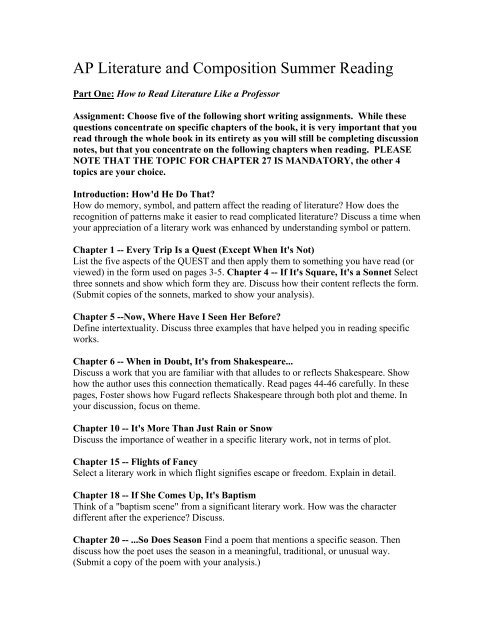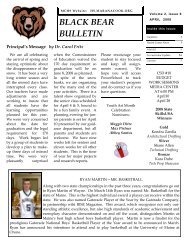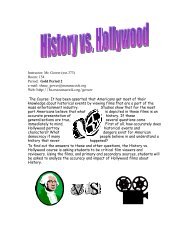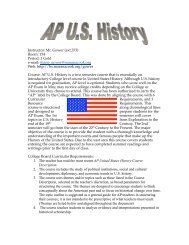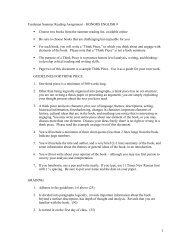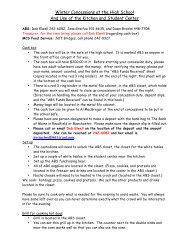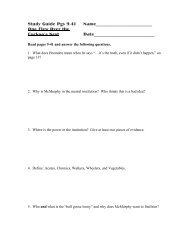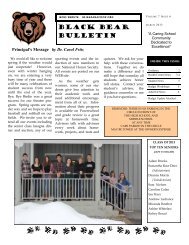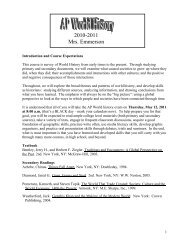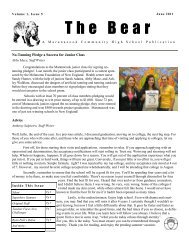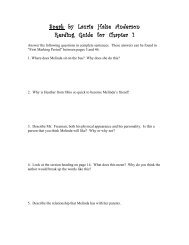AP Literature and Composition Summer Reading (Leavitt)
AP Literature and Composition Summer Reading (Leavitt)
AP Literature and Composition Summer Reading (Leavitt)
Create successful ePaper yourself
Turn your PDF publications into a flip-book with our unique Google optimized e-Paper software.
<strong>AP</strong> <strong>Literature</strong> <strong>and</strong> <strong>Composition</strong> <strong>Summer</strong> <strong>Reading</strong><br />
Part One: How to Read <strong>Literature</strong> Like a Professor<br />
Assignment: Choose five of the following short writing assignments. While these<br />
questions concentrate on specific chapters of the book, it is very important that you<br />
read through the whole book in its entirety as you will still be completing discussion<br />
notes, but that you concentrate on the following chapters when reading. PLEASE<br />
NOTE THAT THE TOPIC FOR CH<strong>AP</strong>TER 27 IS MANDATORY, the other 4<br />
topics are your choice.<br />
Introduction: How'd He Do That?<br />
How do memory, symbol, <strong>and</strong> pattern affect the reading of literature? How does the<br />
recognition of patterns make it easier to read complicated literature? Discuss a time when<br />
your appreciation of a literary work was enhanced by underst<strong>and</strong>ing symbol or pattern.<br />
Chapter 1 -- Every Trip Is a Quest (Except When It's Not)<br />
List the five aspects of the QUEST <strong>and</strong> then apply them to something you have read (or<br />
viewed) in the form used on pages 3-5. Chapter 4 -- If It's Square, It's a Sonnet Select<br />
three sonnets <strong>and</strong> show which form they are. Discuss how their content reflects the form.<br />
(Submit copies of the sonnets, marked to show your analysis).<br />
Chapter 5 --Now, Where Have I Seen Her Before?<br />
Define intertextuality. Discuss three examples that have helped you in reading specific<br />
works.<br />
Chapter 6 -- When in Doubt, It's from Shakespeare...<br />
Discuss a work that you are familiar with that alludes to or reflects Shakespeare. Show<br />
how the author uses this connection thematically. Read pages 44-46 carefully. In these<br />
pages, Foster shows how Fugard reflects Shakespeare through both plot <strong>and</strong> theme. In<br />
your discussion, focus on theme.<br />
Chapter 10 -- It's More Than Just Rain or Snow<br />
Discuss the importance of weather in a specific literary work, not in terms of plot.<br />
Chapter 15 -- Flights of Fancy<br />
Select a literary work in which flight signifies escape or freedom. Explain in detail.<br />
Chapter 18 -- If She Comes Up, It's Baptism<br />
Think of a "baptism scene" from a significant literary work. How was the character<br />
different after the experience? Discuss.<br />
Chapter 20 -- ...So Does Season Find a poem that mentions a specific season. Then<br />
discuss how the poet uses the season in a meaningful, traditional, or unusual way.<br />
(Submit a copy of the poem with your analysis.)
Chapter 21 -- Marked for Greatness<br />
Figure out Harry Potter's scar. If you aren't familiar with Harry Potter, select another<br />
character with a physical imperfection <strong>and</strong> analyze its implications for characterization.<br />
Chapter 22 -- He's Blind for a Reason, You Know Chapter 23 -- It's Never Just<br />
Heart Disease...,Chapter 24 -- ...And Rarely Just Illness<br />
Recall two characters who died of a disease in a literary work. Consider how these deaths<br />
reflect the "principles governing the use of disease in literature" (215-217). Discuss the<br />
effectiveness of the death as related to plot, theme, or symbolism.<br />
Chapter 25 -- Don't Read with Your Eyes<br />
After reading Chapter 25, choose a scene or episode from a novel, play or epic written<br />
before the twentieth century. Contrast how it could be viewed by a reader from the<br />
twenty-first century with how it might be viewed by a contemporary reader. Focus on<br />
specific assumptions that the author makes, assumptions that would not make it in this<br />
century.<br />
Chapter 26 -- Is He Serious? And Other Ironies Select an ironic literary work <strong>and</strong><br />
explain the multivocal nature of the irony in the work.<br />
Chapter 27 -- A Test Case (MANDATORY) Read "The Garden Party" by Katherine<br />
Mansfield, the short story starting on page 245. Complete the exercise on pages 265-266,<br />
following the directions exactly. Then compare your writing with the three examples.<br />
How did you do? What does the essay that follows comparing Laura with Persephone add<br />
to your appreciation of Mansfield's story?<br />
Note to students: These short writing assignments will let you practice your literary<br />
analysis <strong>and</strong> they will help me get to know you <strong>and</strong> your literary tastes. Whenever I ask<br />
for an example from literature, you may use short stories, novels, plays, or films (Yes,<br />
film is a literary genre). If your literary repertoire is thin <strong>and</strong> undeveloped, use the<br />
Appendix to jog your memory or to select additional works to explore. At the very least,<br />
watch some of the "Movies to Read" that are listed on pages 293-294. Please note that<br />
your responses should be paragraphs -- not pages!
Part Two: Discussion Notes must be completed for the following two novels:<br />
The Heart is a Lonely Hunter, by Carson McCullers<br />
The Road, by Cormac McCarthy<br />
Number your notes to follow this template so they will be easy to check. Be careful about<br />
spelling. Feel free to add other elements you would like to remember.<br />
Template:<br />
1. Title, author (check spelling) <strong>and</strong> publication date<br />
2. Major characters (check spelling)<br />
• Their roles in the story <strong>and</strong> relationship<br />
• Summarize what drives them (motivation)<br />
3. Minor characters you might like to remember<br />
• Roles <strong>and</strong> relationships<br />
• Any foils?<br />
4. Setting (time <strong>and</strong> place)<br />
5. Plot<br />
• Summarize it briefly<br />
• Chart the exposition, rising action, climax, turning point, denouement, etc.<br />
• Note key conflicts that propel the plot<br />
6. Themes, big ideas (list <strong>and</strong> comment briefly on at least three)<br />
7. Describe at least three key scenes <strong>and</strong> why they are important<br />
8. Discuss the ending—is it open-ended or neatly resolved?<br />
• What do the characters learn, how do they change?<br />
9. Narrative point of view—describe it <strong>and</strong> note how it contributes to meaning/impact<br />
10. Writing style—describe <strong>and</strong> offer at least two specific examples<br />
11. Note key symbols, motifs, <strong>and</strong> / or images—how do they contribute to meaning?<br />
• Symbol: a person, image, word, object, color, idea, action, event, etc. that evokes<br />
meanings beyond the literal<br />
• Motif: a recurring, unifying element (image, symbol, character type, action, phrase,<br />
etc.)<br />
• Image: a word, phrase, or figure of speech that appeals to the senses<br />
12. Patterns (what goes with what, what contrasts with what?)—these might involve<br />
images, characters, events, etc.<br />
13. Copy out at least three memorable quotes, noting page number <strong>and</strong>, if relevant,<br />
speaker <strong>and</strong> context
Part Three:<br />
Essays: Choose ONE of the following prompts <strong>and</strong> the corresponding novel for the<br />
essay assignment. Whichever novel you do not choose, you will be required to write<br />
address the prompt in class during the first week of school<br />
From the summer reading, you will compose one well-developed (i.e. hook, arguable<br />
thesis, topic sentences, direct citations <strong>and</strong> analysis, clear progression of argument, etc.)<br />
FOUR to FIVE (full) pages MLA- formatted essay answering the following prompt.<br />
MLA-formatted means you MUST include in-text citations <strong>and</strong> a Works Cited Page.<br />
The Heart is a Lonely Hunter<br />
Prompt: “And, after all, our surroundings influence our lives <strong>and</strong> characters as much as<br />
fate, destiny or any supernatural agency.” Pauline Hopkins, Contending Forces<br />
In this novel cultural, physical, or geographical surroundings shape psychological or<br />
moral traits in the characters. Write a well-organized essay in which you analyze how<br />
surroundings affect one of the characters from The Heart is a Lonely Hunter <strong>and</strong><br />
illuminate the meaning of the work as a whole.<br />
The Road<br />
Prompt: Palestinian American literary theorist <strong>and</strong> cultural critic Edward Said has written<br />
that “Exile is strangely compelling to think about but terrible to experience. It is the<br />
unhealable rift forced between a human being <strong>and</strong> a native place, between the self <strong>and</strong> its<br />
true home: its essential sadness can never be surmounted.” Yet Said has also said that<br />
exile can become “a potent, even enriching” experience.<br />
Discuss how in the novel The Road the characters experience such a rift <strong>and</strong> become cut<br />
off from “home,” whether that home is the characters’ birthplace, family, homel<strong>and</strong>, or<br />
other special place. Write a well-organized essay in which you analyze how one of the<br />
character’s experience with exile is both alienating <strong>and</strong> enriching, <strong>and</strong> how this<br />
experience illuminates the meaning of the work as a whole.<br />
DUE DATES:<br />
1. How to Read <strong>Literature</strong> Like a Professor writing prompts <strong>and</strong> novel essays are due no<br />
later than Monday, August 19, 2013!<br />
2. Discussion notes are due the first day of school!<br />
All assignments may be submitted by email, Google Docs, or hard copy via mail:<br />
Am<strong>and</strong>a <strong>Leavitt</strong> am<strong>and</strong>a_leavitt@maranacook.com<br />
14 <strong>Leavitt</strong> Rd.<br />
Raymond, ME 04071


